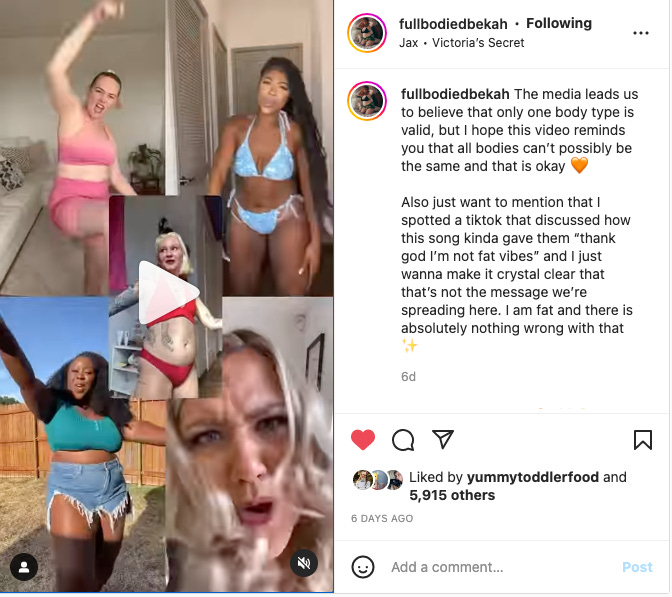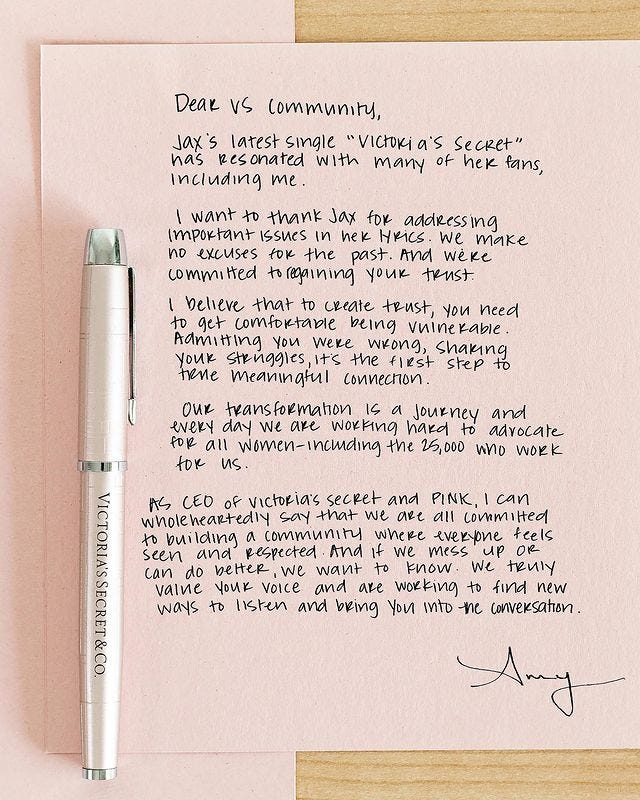The first time I played it for my kids, I cried. They were intrigued — I played them this video and then also this one—and they were mesmerized by the dancing, and especially, dancing in a big group of people, in public. But they were not emotional. My younger daughter immediately started singing the chorus and then turned to me: “Wait, what’s a dude?”
“A man,” I said. “We live in a culture where sometimes men try to tell women and girls what we should look like and what we can do with our bodies.”
“But only we can make the babies,” she huffed, and then went back to singing. She’s almost five. Her feminism is coming online in little bursts right now. I think of it as a collage and I’m constantly adding bits and pieces to it.1
My older daughter, who turns nine this week, was more interested in the strategy. “So did the protest work?” she asked. “Did the store close down?”
My friend Lyz Lenz reports that her 11-year-old was similarly dispassionate: “It did not seem like a revelation to her,” she texted me. “She was just like yeah, of course bodies are different.😭”
We are talking, of course, about “Victoria’s Secret,” the viral new song of the summer by TikTok influencer and former American Idol contestant Jackie Miskanic, better known as Jax. Jax wrote the song for Chelsea, a 12-year-old girl she babysits, after Chelsea came home from the mall crying because a friend called her “too flat and too fat” when they tried on bikinis. That first video now has over 39 million views between TikTok and Instagram while the version I showed my kids, where Jax organizes a flash mob outside an actual Victoria’s Secret and performs the entire number, has 32 million views. “Victoria’s Secret” is on Billboard’s Hot 100 and in the top 3 on iTunes.
In the song, Jax talks about how the rigid beauty culture of Victoria’s Secret and magazine covers helped fuel her eating disorder: “I stopped eating, what a bummer/Can’t have carbs and a hot girl summer.” And then she explains that Victoria’s real secret is that she’s an “an old man who lives in Ohio, making money off of girls like me” referring to Les Wexner, the 84-year-old billionaire who founded Bath & Body Works, Inc, which owns Victoria’s Secret as well as Abercrombie & Fitch and Express—in other words, your entire 90s and early 2000s aesthetic/suburban mall experience. (Wexner also has Jeffrey Epstein ties, just in case we have any doubt how much he values young women and their bodies.)
Jax says she wrote this song for her younger self, and to help girls today understand that their body isn’t their value. But I think she wrote it for Millennial Moms. Which to be clear, she is not. At 26, Jax is a baby Millennial or an elder Gen Z, depending how you define these things. She was born the year I turned 15. I spent a lot of that year shopping with my friends for bras at Victoria’s Secret and low-rise jeans at Abercrombie & Fitch. It was Les Wexner’s world and we were just living in it, though we had no idea who he was. We just knew that we wanted Britney Spears’ torso and if we didn’t have her abs and couldn’t afford the jeans, we could at least get the cucumber melon body spray.
Clearly, not enough has changed if a decade or so later, pre-teen Jax was comparing herself to the Victoria’s Secret Angels and embarking on her own eating disorder. But the way this song is landing gives me hope that we are, in fact, making progress, however incrementally, at long last. Many of the TikTok lipsync tributes2 to Jax’s song are by moms, for moms. They film their daughters dancing to it, they film themselves dancing to it. The song is the new anthem of body positive influencers too, of course—my favorite is this mash-up by @fullbodiedbekah—and not all of them are moms or Millennials. But they are our younger siblings; they learned from us about the power of the push-up bra and the myth of visible abs. And they—we!— are all, collectively, now saying, fuck it. “I wonder if Gen Z understands how much courage they are giving us millennials,” says Jennifer Toone, a BT reader and mom of six in Sacramento, California.
“Victoria’s Secret” is not a perfect song. I wince, in the initial video when Chelsea reports the “fat and flat” insult and Jax makes an outraged face but doesn’t clarify whether her outrage communicates “there’s nothing wrong with being fat or flat!” or, more likely, “can you believe they called this skinny child fat?!” It’s an important distinction because whenever we use fat as an insult we reinforce the message that it’s bad. We could similarly parse the lyric, “Photoshop, itty bitty models on magazine covers/told me I was overweight.” And I want to see more men dancing to the video, as well as people wearing something other than a bikini. Yes, it’s progress that all bodies can be bikini bodies but we could go even further and say, hey, also, hotness is optional. And it’s a sign of how far we still have to go that this viral hit comes to us from a thin, white, able-bodied, blonde woman.
On the other hand, we already have Lizzo. Songs about body autonomy shouldn’t be the work only of fat creators of color. Think how different the 90s would have been if Jessica, Britney and Cristina had sung about the ways their bodies were manipulated, controlled and exploited by their male music producers. Thin white women are overly centered in conversations about body positivity but they also arguably have the biggest responsibility to dismantle beauty and diet culture instead of continuing to perpetuate and profit off it.
So does “Victoria’s Secret” dismantle anything? Or as my kid put it: Did the protest work? “That dude from Ohio is no longer a part of our business,” the brand wrote in their damage control response to Jax. But she’s not buying it: “Or did he move out of Ohio to chill with Epstein, give us all body dysmorphia, liquidate the 1.2 billion, and ghost when people caught on?” she replied. Three days ago, Victoria’s Secret posted a note (handwritten on pink paper) from their CEO, Amy Hauk, praising the song and reassuring their customers, “we truly value your voice.” Jax reposted it on her Instagram and TikTok, inviting her followers to tell the brand what changes they wanted to see. There are well over 100,000 comments between the two platforms asking for extended sizing, older models, less Photoshop, more stretch marks and cellulite.
We’ll see what Amy and her pink notepaper do with this intel. The Victoria’s Secret website certainly doesn’t show any signs of progress: Their sizing stops at an XXL or 1X for clothes and 44F for bras. Their models are still as uniformly and unrealistically thin and toned as Heidi and Gisele were when I studied their swimsuit catalogs in middle and high school. They are selling hotness, as it is defined by straight cis men. Nothing communicates that this is a store that “advocates for all women,” as they claimed in their statement. My money is on an Old Navy-style lip service campaign, featuring one hot (and white and thin) 65-year-old, many hot (but young and thin) women of color, and one hot (and white) fat model, plus some 1X swimsuits re-labeled as 3X, and six months later, a return to the status quo.
Maybe I’m wrong and they’ll do better. Or maybe it doesn’t matter, because a brand founded by men, that sexualizes and objectifies women’s bodies for men and money, is never going to be the catalyst for change we want or need. This revolution isn’t happening at the mall. And we don’t need it to, because we don’t need the corporations that have always gotten this wrong to fix this for us. We can buy our underwear elsewhere. I’m not saying that’s easy or that the fight for size-inclusive clothing shouldn’t continue. But asking Victoria’s Secret to expand their definition of beauty is still letting them set the standard of beauty, is still placing a premium on the importance of beauty, and of underwear and swimsuits needing to be beautiful. And that’s the part we can reject.
Maybe I’m just in that sentimental, end-of-summer mood where everything feels wistful and hopeful at the same time. Maybe I’m just relieved to have finally replaced “Firework” as the most-requested ear worm song in my house. I spend all of my professional time and many of my off hours thinking about the toxicity of diet culture and anti-fat bias, and in particular, the impact of this toxicity on our children. So I know we have so much work to do; that we need to continue to unlearn our own biases, and figure out how to give kids the tools they need to name and navigate this shit.
But watching the kids today (my own, my friends’ kids, strangers’ kids on social media) embrace this song without needing to cry over—without even realizing what a revelation it is for a pop song to challenge beauty culture—it is giving me hope. I love “Victoria’s Secret” because Jax is telling me what I wish we both knew when we were younger. I think, maybe, the kids love it because she’s telling them what they already know.
PS. Loved this by Sharon Hurley Hall on being a Black woman introvert at work.
And we’re all still losing our minds about this house tour, yes? Yes.
We’re working on her gender inclusivity too. (Just to be clear that I know/have explained that not all women can or want to make babies!)
Corinne and I can’t decide what these are called. Is there a technical TikTok term for making your own dance routine to someone else’s song? Enlighten us, Gen Z.









I love this. The other day I was lamenting something fatphobic that happened or was said that I needed to debrief with my oldest, and my husband said, “Of course, do that if you want to, but I actually think she’s got it. That message has landed with her.”
I did ask her about it later, and she very succinctly said, “I noticed that too. It was wrong.”
Hopefully we’ll also get to advocacy and ways to use our privilege to speak up against some of these fatphobic messages and moves, but in fact the message has landed. Thank goodness for Gen Z, and Jax, if you read this, thank goodness for you!
CUCUMBER MELON